|

THE
TIMES LIVE 25 MAY 2016 If present trends continue‚ there will be more than 700 million tons of plastic in the ocean by
2050‚ outstripping the weight of fish.
This is the warning issued on Wednesday by the African Marine Waste Network‚ to be launched in July‚ as African countries join hands to stem the torrent of plastic waste entering the oceans.
"International organisations now fear that Africa may soon become as badly polluted as South-East Asia‚ which has the foulest record on the planet‚" said Stephane Meintjes of the Sustainable Seas Trust‚ one of the founders of the network.
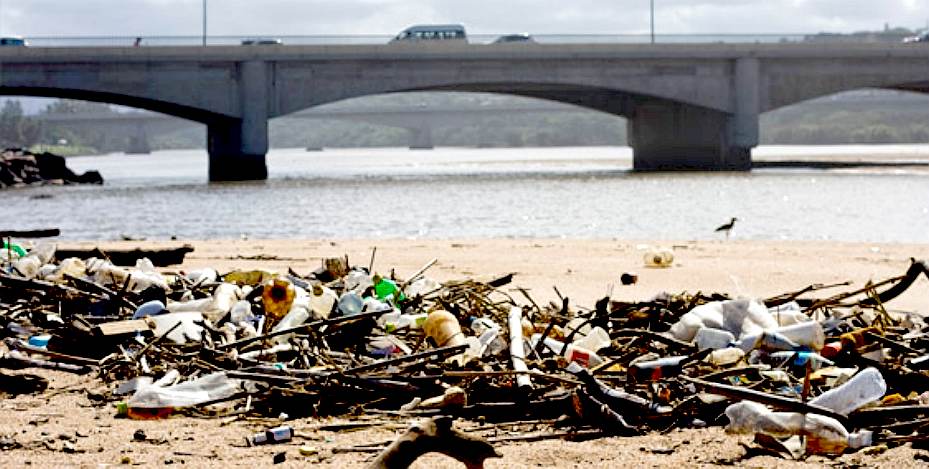
"The exact amount of debris entering the sea from South Africa or any other African country is not known. What is known‚ however‚ is that the rapid development of Africa‚ coupled with poverty‚ has seen waste accumulation outpace management.
"The network urgently needs to find out how serious the African problems are‚ where they are and how to address them."
Meintjes said that worldwide‚ 270kg of plastic entered the sea every second. Plastic washed into rivers and estuaries and then carried to the sea was the main problem.
"By 2045 the flow of plastic into the sea will be 600kg per second … if present trends continue. This situation poses a serious threat to
humans‚ to animals and plants and to ecosystems."
The network‚ to be launched in Port Elizabeth‚ was "an African cross-boundary initiative supported by the private sector which aims to make a contribution to solving a global crisis".
The Sunday Times recently reported that South Africa’s beaches are awash with plastic - as many as 400 items per metre‚ according to scientific data due to be released by industry body Plastics SA‚ a partner in the network.
Plastic accounts for well over 90% of beach litter‚ with plastic packaging items the most common.
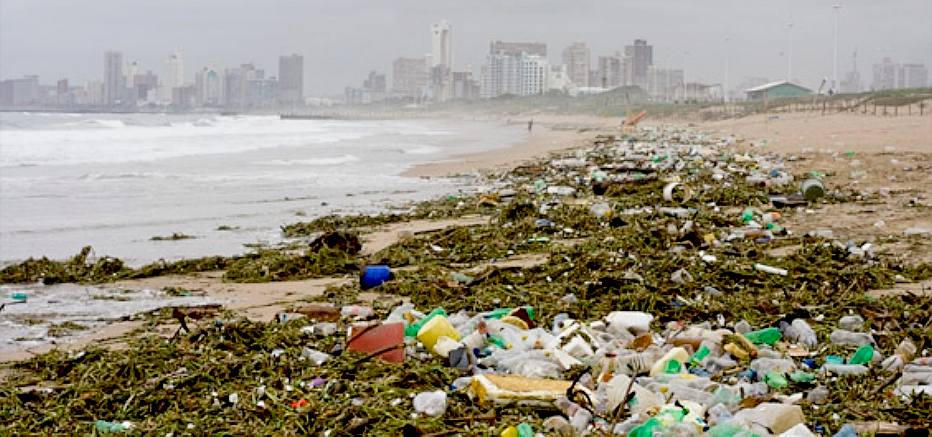
DURBAN
- The Blue Lagoon is a cesspit of untreated sewage, with plastic
extremely visible as the non-biodegradable quotient that mankind is not
yet doing enough to negate.
ZIGZAG
20 MAY 2016 - DIGGING DEEPER THROUGH THE WATER
Blue Lagoon (or ‘Lugs’ if you’re a Durbs local) is the stretch of beach just north and south of the uMngeni River mouth. Not only is it a famous spot for braai’s, picnics, car bars and
fishing – but it is also infamous for its pollution. From mounds of plastic to rusty
electronics, everything and anything can be found washed up on the beach at ‘Lugs’ – even potentially hazardous medical waste.
Durban beach users were advised on Tuesday 17 May 2016 that the uMngeni/Mangrove, Beachwood, Virginia and Glenashley beaches have been temporarily closed due to the excessive amount of medical waste which recently washed up and the clean-up operations currently underway to remove it. The beaches are expected to be closed for the next two weeks.
In a statement issued on Wednesday by eThekwini Municipality’s Communications Head, Tozi Mthethwa, this is what went down:
“A member of the public, who was walking along the beach, contacted the Health Unit about the unusual sight of medical supplies washed up at the shore line on Monday, 16 May 2016. Upon further inspection on Tuesday, the Health Unit discovered that the spillage was spread across several kilometers of the shoreline. After consultation between the relevant Municipal departments and as a precautionary measure, a decision was taken to close the beaches to allow for the clean-up operation to happen.”
It has been reported that the recent medical waste discovered on the beaches consists of various types of pills as well as sealed packets of male and female condoms. According to eThekwini Parks Head, Thembinkosi Ngcobo, an investigation is underway to determine the source of the medication. He has also speculated that about half a ton of pills had also been dumped in the ocean.
The eThekwini Municipality also made a point of noting that no syringes have been found washed up on the beach as of yet – which is good news for KZN surfer John McCarthy who stood on a needle and syringe, that had been irresponsibly discarded, while taking a run on the beach last month.
According to Bart Fokkens, Field Manager for the Dusi uMngeni Conservation Trust (DUCT) , the medical waste arrived on the beaches with the floods ten days ago. He also speculates that the waste arrived here due to poor waste disposal. “People are desperate for money. Instead of taking the waste to an official dumpsite [where you pay per load] they dump it down the river banks,” says Bart. “There is tons of waste that is going unmonitored and uncontrolled and the city is not doing enough to prevent this,” he continued.
According to Bart – who is currently in the process of tracking the source of excessive motor vehicle oil leaking into the uMngeni – the tablets and unused condom packets can be traced through the VAT numbers on the packaging. These can in turn be traced back to the clinic from which the products came, as well as the waste disposal companies the clinics utilised. 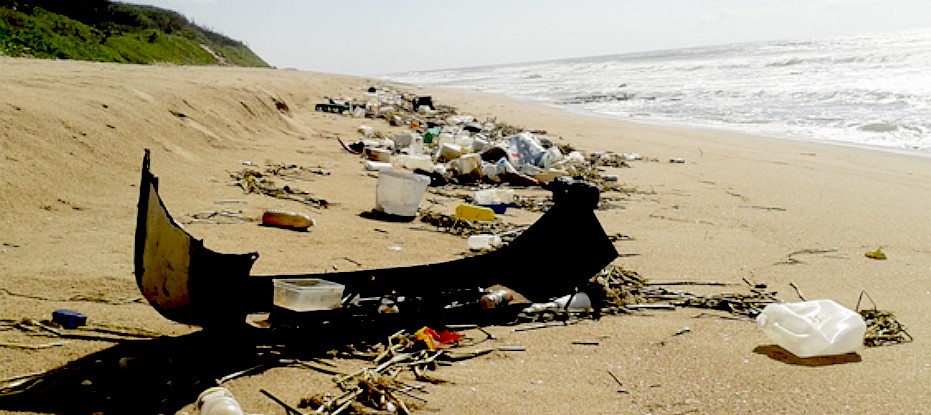
TREASURE
BEACH
- Not quite doubloons or pieces of eight, but plastic can be recycled
and has a value when it can be harvested economically.
It appears that the medication has not been used and the municipality have been unable to estimate the quantity of medical waste as of yet as the spillage is spread across Suncoast to Virginia Beach.
Over the past ten days Bart and his team have removed over two tons of recyclable waste between the uMngeni River mouth to approximately one kilometer south of the mouth. He is urging public to sort the recyclable material (which makes up approximately 80% of the washed up waste) at the beach, as this saves The City transporting the waste to landfill sites. Recycling bags filled with waste can be dropped off at the Green Hub where they are collected by recycling companies.
The City has announced that they will be upping their game with regard to waste management and ocean / estuary pollution. According to Margaret Burger of The uMngeni Estuary Conservancy, there are many exciting projects in the pipeline which have the aim of cleaning the tributaries such as the Aller River and the Palmiet River; as well as the consistent hard work done by DUCT which is funded by the municipality through the Durban Green Corridor.
With about 270kgs of plastic entering our oceans every second, plastic pollution may not be a new issue, but it is one which needs to be taken seriously – by the public, by the authorities and by The City. Plastic which gets washed into rivers and estuaries gets carried out to sea, beaches and rocky-shores and is a major contributor to the destruction of our oceans and marine life.
By 2045 the flow of plastic into the sea will be an estimated 600kgs per second; 36 tons per minute or 2160 tons per hour, if current trends continue. This situation poses a serious threat to humans, to animals, plants and ecosystems. Estimates suggest that there are 150million tons of plastic in the sea at the moment and again, if present trends continue, there will be more than 700 million tons in the ocean by 2050, outstripping the total weight of fish in the sea.
Plastic Pollution will be in the spotlight on July 25th and 26th in Port Elizabeth. During these two days the Sustainable Seas Trust, Plastics SA and other partners will launch the African Marine Waste Network. Although the launch will take place in South Africa, the African Marine Waste Network will be the first to address marine waste at a Pan-African level.
It is hoped that all South Africans will join this initiative to help Africa to play its role in responsible waste management. Afterall it is our responsibility to make reducing, re-using and re-cycling a part of our culture to ensure that the children of our planet have a better surf and a better tomorrow.
Contact Durban Green Corridor for more info on recycling and beach clean-ups and join the beach clean up happening tomorrow at the Beachwood Mangroves, Durban. Details here:
Facebook events
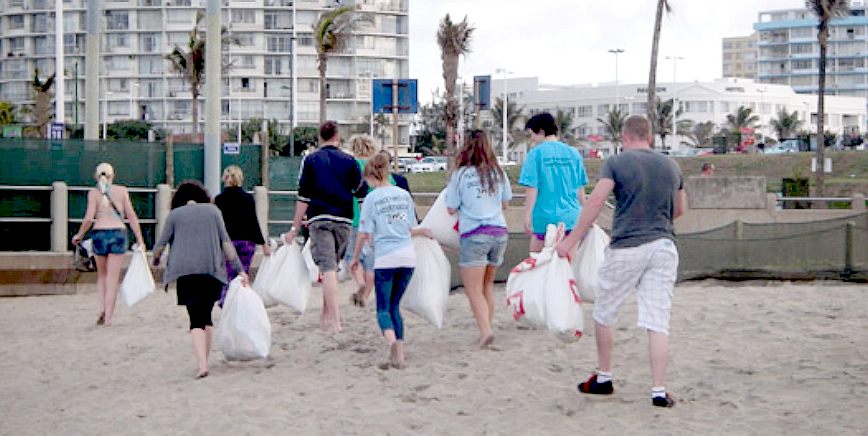
BEACH
WATCH - Surf City
should be proud of the volunteers who give up their time to collect waste
from the beaches.
SOUTH
AFRICAN MARINE LITTER NETWORK Over the last few decades there has been a steady increase in the use of plastic products resulting in a proportionate rise in plastic debris in the seas around Southern Africa but compared to the Northern Hemisphere the issue of marine debris does not receive the same attention in the Southern Hemisphere. Plastic is used extensively in both food and water packaging because of their inherent properties such as low bulk densities and inertness that make them convenient carrier materials and low risk contaminants. The uses of plastic packaging and agriculture plastics have become widespread in the sub-region. However, the packaging revolution has not been correspondingly backed by appropriate plastic waste management policy. Southern Africa has 28 212 km of coastline and with the islands in the Indian, Atlantic and Southern Atlantic Oceans, the sub area can play an important role in reducing the amount of manmade material finding its way to the sea. Marine debris is receiving limited attention in Africa and it is because of this lack of understanding and a unified plan to addressing the problem on the continent that a summit was held in Cape Town during June 2013 to establish a network and work towards increasing research, raising awareness of the issue as well as actions to reduce marine debris.
Plastics SA is a co-signatory of the Global Plastics Industry Marine Declaration on Marine Debris and has started various projects to combat marine debris and increase recycling of the material. The summit was supported by UNEP and the South African government and delegates from various African countries was brought to South Africa. One of the main goals of this conference was to establish a network for African countries on the issues of marine debris. This was a lofty objective and it became very clear at an early stage that most of the undertakings would not be met. 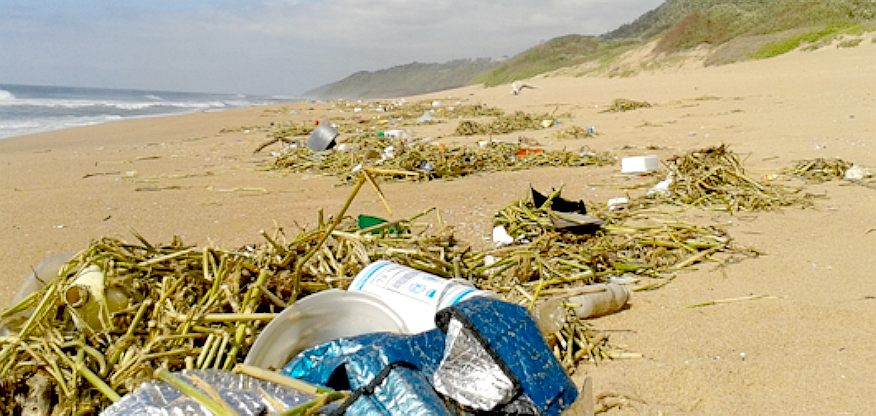
POLLUTION -
For miles the
pollution stretches along the beaches, spoiling and otherwise beautiful
area.
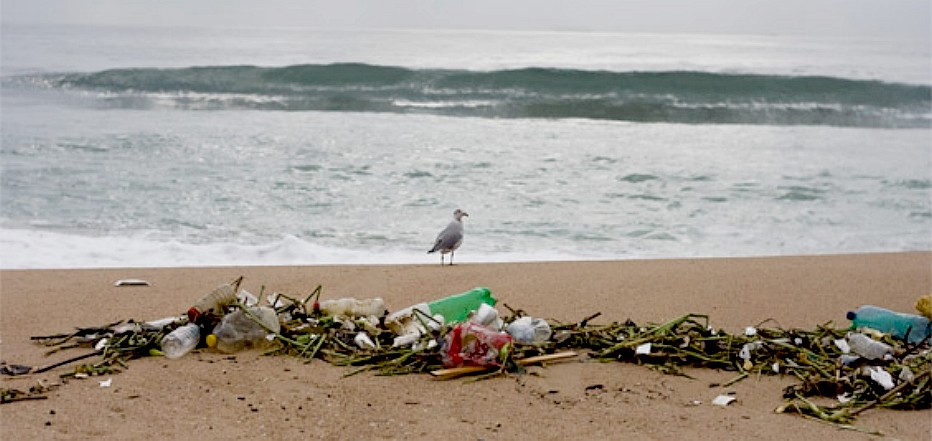
SEABIRDS
- To birds looking for a tasty snack, the multi-coloured plastic bottle
caps and other items, represent an irresistible meal that will guarantee
that the die a horrible death from starvation.
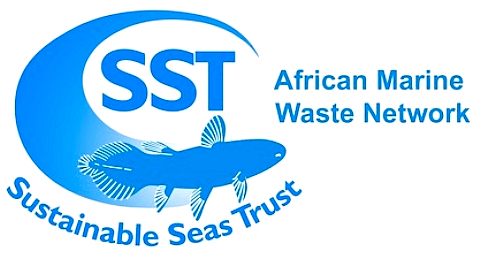

LINKS
& REFERENCE
ZigZag
SA Durban news digging deeper through the waste
The
Terramar Project Africa throws nets reverse tide plastic pollution
Marine
Litter Network South-African marine litter network
Times
Live SA science technology 2016 May 25 Africa throws out its net to stem
plastic pollution in oceans
https://www.facebook.com/events/956369987794138/
http://www.zigzag.co.za/news/digging-deeper-through-the-waste/
http://theterramarproject.org/thedailycatch/africa-throws-nets-reverse-tide-plastic-pollution/
http://www.marinelitternetwork.org/group/south-african-marine-litter-network
http://www.timeslive.co.za/scitech/2016/05/25/Africa-throws-out-its-net-to-stem-plastic-pollution-in-oceans
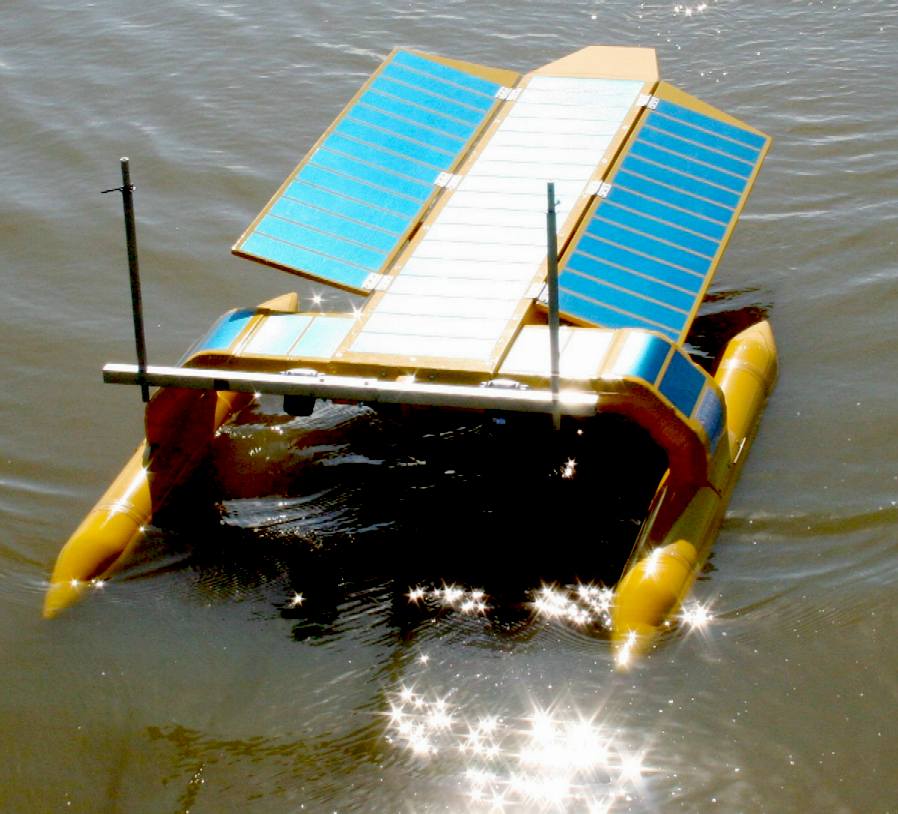
UN
CONCERNS ON MARINE LITTER - Marine litter (debris) issue was addressed
at the 60th and 63rd UN General Assembly held in October 2005 and in
September 2008, respectively, and was reflected in the resulting
resolutions. The Global
Ocean Commission recommended no action to tackle plastic waste in their
2013-2014 report. In light of the present concerns that recommendation appears not only
irrational but smacks of a political whitewash.
ACIDIFICATION
- ADRIATIC
- ARCTIC
- ATLANTIC - BALTIC
- BAY BENGAL - BERING
- CARIBBEAN - CORAL - EAST
CHINA
ENGLISH CH
-
GOC - GULF
GUINEA - GULF
MEXICO
- INDIAN
-
IRC - MEDITERRANEAN -
NORTH SEA - PACIFIC
- PERSIAN GULF - SEA
JAPAN
STH
CHINA - PLASTIC
- PLANKTON - PLASTIC
OCEANS - SEA
LEVEL RISE - UNCLOS
- UNEP
WOC
- WWF
AMAZON
- BURIGANGA - CITARUM - CONGO - CUYAHOGA
-
GANGES - IRTYSH
- JORDAN - LENA -
MANTANZA-RIACHUELO
MARILAO
- MEKONG - MISSISSIPPI - NIGER - NILE - PARANA - PASIG - SARNO - THAMES
- YANGTZE - YAMUNA - YELLOW
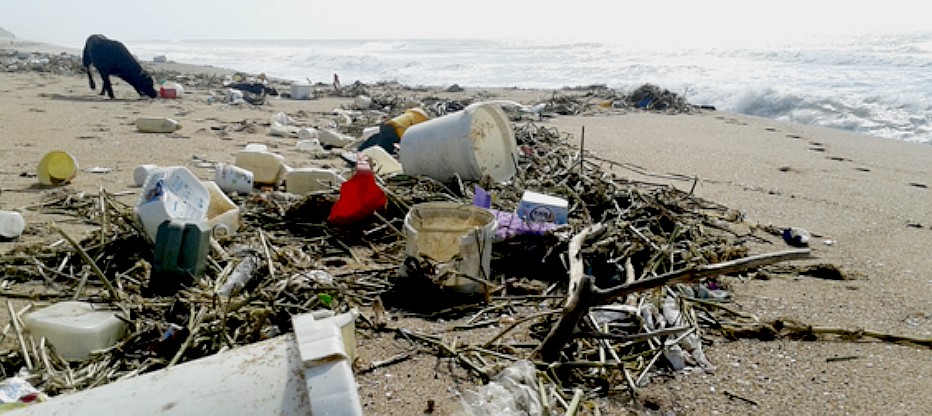
|









